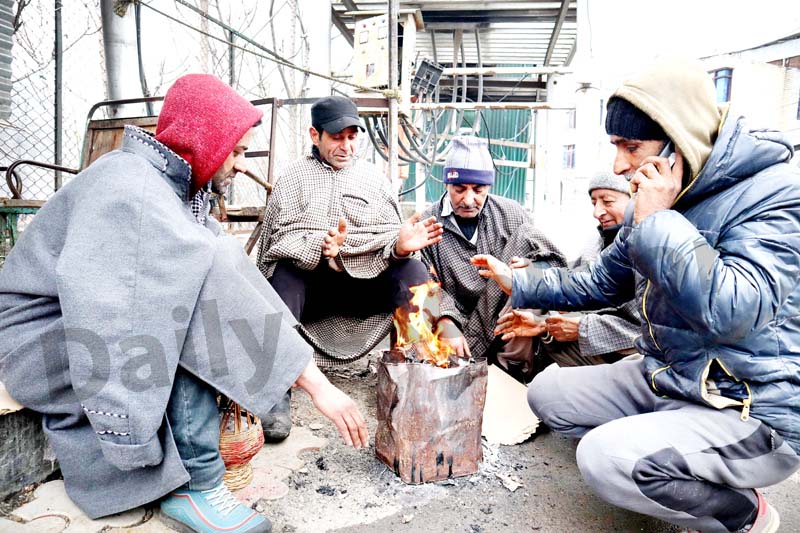Cold intensifies, min temps to improve this week
Excelsior Correspondent
Srinagar, Jan 31: Kashmir that is reeling under extreme cold weather conditions witnessed the coldest night of the season after 30 years with temperatures plummeting to minus 8.8 degree Celsius and maximum day temperature settling at 0.6 degree Celsius which was the coldest day of the season.
The Mercury tumbled across Kashmir last night with Srinagar recording minus 8.8 degree Celsius, the lowest temperature of the season so far and the coldest January night in the last 30 years.
A Meteorological department official said that at minus 8.8 degree Celsius, the mercury in Srinagar was more than eight degrees below normal for this time of the season. The previous night, Srinagar recorded minus 7.2 degree Celsius.
The minimum temperatures have consistently remained far below normal this season. On January 14, Srinagar recorded minus 8.4 degree Celsius. On 20 January 1991, Srinagar witnessed a low of minus 11.8 degree Celsius while the lowest ever temperature was recorded on 31st January 1893 when the mercury plummeted to minus 14.4 degrees Celsius. In between, the official said, the mercury dropped to minus 9.0 degree Celsius on 11th January 1986.
Director Meteorological Department Sonam Lotus said that the temperatures hovered at minus 8 degree Celsius or less 17 times in last 38 years. “In last 38 years, there has been 17 occasions when Srinagar recorded minus 8 degree Celsius or less with 1991 remaining the coldest and harshest winter with prolonged cold spell of 9 days when temperature remained minus 8 degree Celsius or less,” he said.
The minimum temperature also hovered around far below the normal for other parts of the Valley today. The mercury settled at minus 12.0 degree Celsius in Pahalgam against minus 12.5 degree Celsius the previous night.
Qazigund recorded a low of minus 10.2 degree Celsius against minus 8.8 degree Celsius the previous night while Kokernag recorded a minimum of minus 12.4 degree Celsius against minus 10.9 degree Celsius the previous night.
Gulmarg recorded a low of minus 8.0 degree Celsius against minus 10.0 degree Celsius the previous night.
The mercury settled at minus 2.3 degree Celsius in Kupwara against minus 3.7 degree Celsius the previous night.
Srinagar recorded maximum day temperature of 0.6 degree Celsius which was lowest of the season so far. Yesterday it was 2.0 degree Celsius. Khudwani in Kulgam was coldest at minus 2.0 degree Celsius.
Qazigund recorded maximum of 0.8° degree Celsius, Pahalgam 3.5 degree Celsius, Kupwara 1.3 degree Celsius, Kokernag 0.8 degree Celsius, Gulmarg 2.5 degree Celsius, Srinagar Airport 0.4 degree Celsius, Anantnag 0.5 degree Celsius, Shopian minus 1.1 degree Celsius, Khudwani minus 2.0 degree Celsius, Pulwama 0.4 degree Celsius and Kulgam minus 1.6 degree Celsius.
The water taps and water bodies were already frozen in Kashmir with people facing severe water crisis. The remaining taps also went dry today with temperatures further plummeting. Some people are melting snow to get water for drinking and cooking purposes.
The water bodies including Dal lake which were already frozen and today it was too difficult for the boat men to cut the ice and row the boats.
‘Chillai-Kalan’- the 40-day harshest winter period which commenced on December 21, has ended. The period is considered the harshest of the winter when the chances of snowfall are most frequent and maximum.
This season there have been already at least two spells of considerable snowfall. The cold wave, however, continues even after that in Kashmir with a 20-day-long ‘Chillai-Khurd’ (small cold) and a 10-day-long ‘Chillai-Bachha’ (baby cold).
The weatherman has forecast cloudy weather from tomorrow morning. The official said that night temperatures will definitely improve by few notches next week.
He said that a feeble Western Disturbance is likely to cause isolated to scattered precipitation during 1-3rd February due to which “we expect a gradual rise in minimum temperature from tomorrow.”


